Stuart Forster drives to Steel Rigg for a Hadrian’s Wall hike at Sycamore Gap, one of the most accessible and popular countryside locations for walking Hadrian’s Wall in Northumberland, England.
Disclosure: Some of the links below and banners are affiliate links, meaning, at no additional cost to you, I will earn a commission if you click through and make a purchase.
One of the joys of springtime is waking early to sunshine and a clear blue sky, seizing the opportunity to head into the countryside for a walk. On such a gorgeous morning why not head to walk along Hadrian’s Wall at Sycamore Gap in Northumberland?
Those were our thoughts on pulling back the curtains yesterday morning. Yet as we headed out of Newcastle clouds began scudding across the blue of the sky. Within a couple of miles, light rain began to speckle the windscreen. The sky above the hills ahead soon looked a murky mid-grey. Perhaps applying sunscreen had been a tad optimistic? Was heading west really the best of ideas? Hopefully, the rain clouds would pass. Mere April showers?
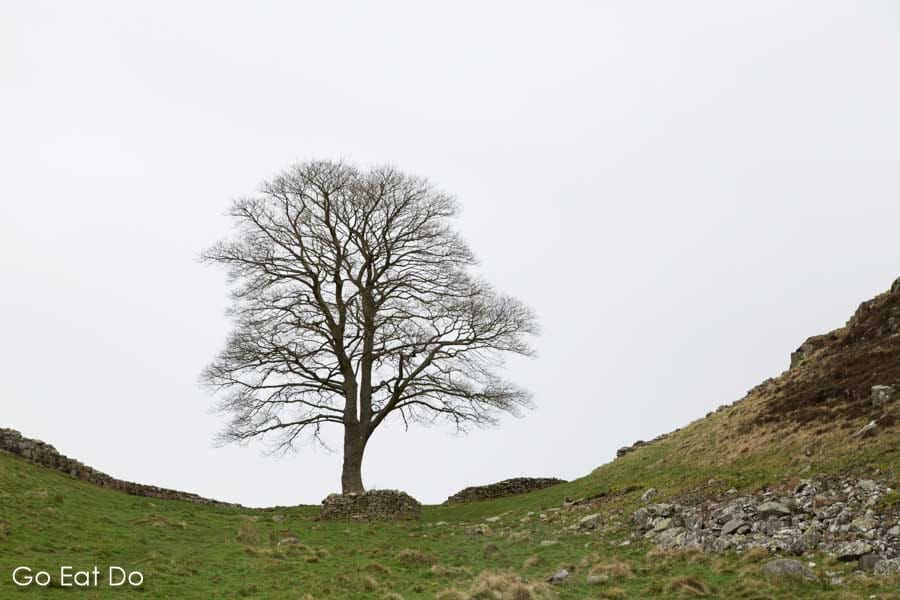
Sycamore Gap Walk
Sycamore Gap is named after a tree standing at the dip between two hills on the barrier erected by the Roman Army from 122 onwards, marking the northwest frontier of their empire. Movie buffs may recognise it as a location from Robin Hood: Prince of Thieves, the 1991 blockbuster starring Kevin Costner as Robin of Locksley.
Steel Rigg, in Northumberland, was our goal. The compact car park there is a good starting point for walks over the Hotbank Crags via Sycamore Gap to the well-preserved Roman fort at Housesteads. The area holds some of the most impressive remaining stretches of Hadrian’s Wall, which was inscribed as a UNESCO World Heritage Site in 1987.
In the centuries after the Romans withdrew from the British Isles people plundered the wall along the frontier for its stone. “Why quarry rock to build homes and churches when there’s a seemingly limitless supply on that pointless wall that runs right across the county? Nobody owns it.” Words to that effect were undoubtedly uttered during the Middle Ages.
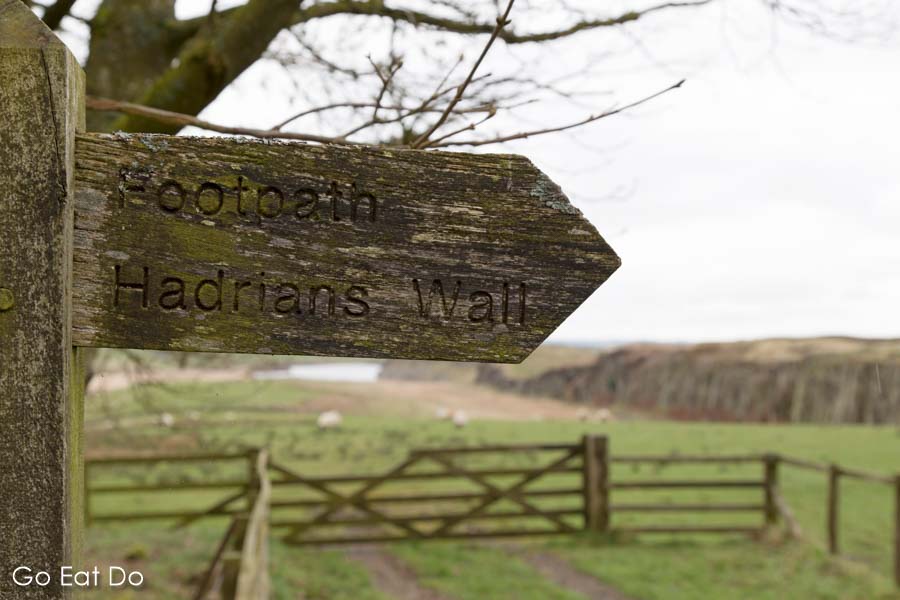
Northumberland National Park
Consequently, the best-preserved stretches of the Roman wall tend to be those well away from human settlements. In the remote countryside above Hotbank Crags and Crag Lough, part of Northumberland National Park, it still stands shoulder high in places.
Lichen dapples the surface of the ancient barrier and grass sprouts from its top. Almost two millennia may have passed since masons shaped their stone blocks, but their skill is still perceptible. The soldiers who toiled to build the wall lined up the stones with precision.
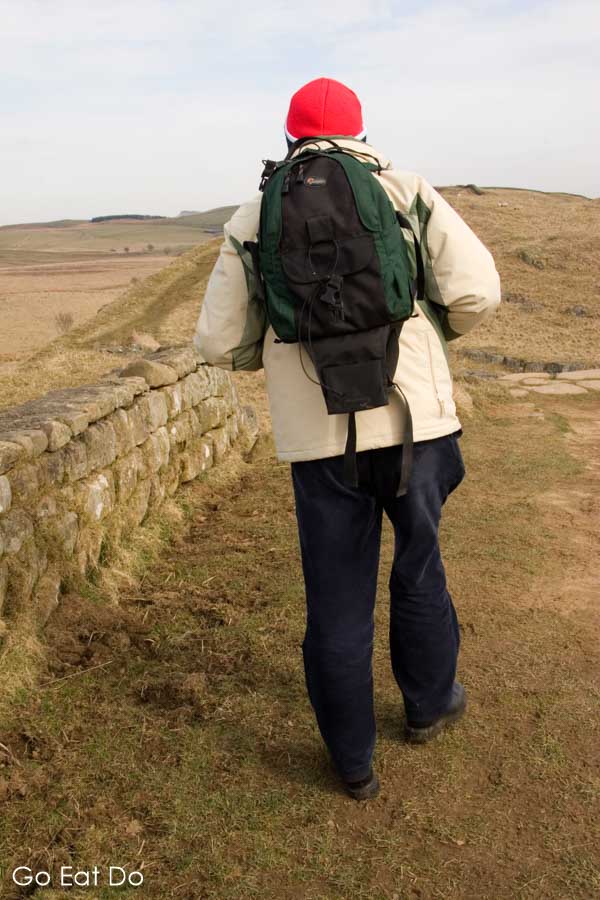
Hadrian’s Wall circular walks
Be warned, the grass on the hillside leading down from Steel Rigg can prove slippery. Like the mighty Roman Empire, I fell. Even good walking boots did little to help. It’s a good idea to bring a change of clothing and footwear, in case you end the day caked in mud.
This is an undulating section of countryside and requires walkers to be moderately fit. There are stone steps on the hillsides plus a couple of sections of squelching, ankle-deep mud.
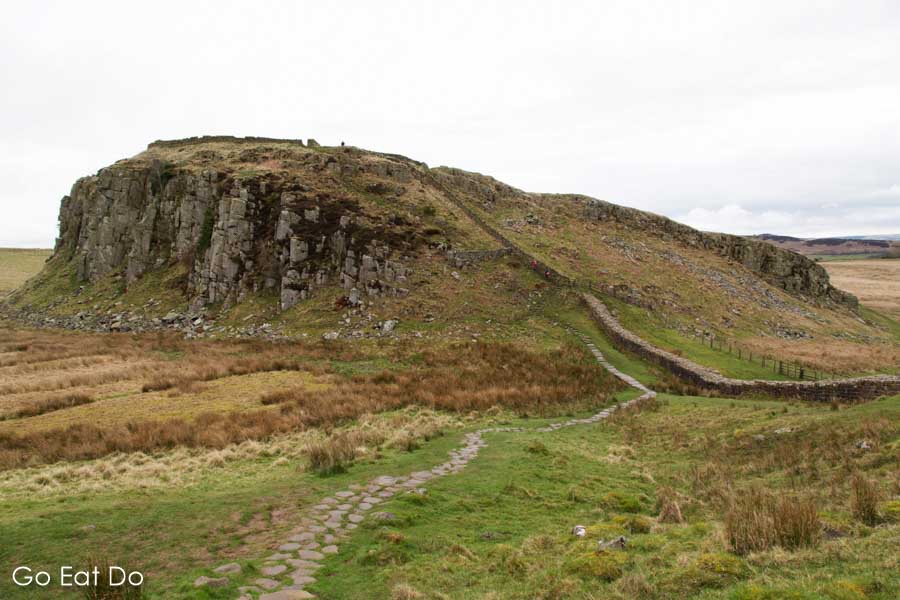
Hadrian’s Wall hike
The walk to Sycamore Gap takes you past one of the mile castles where soldiers were stationed along the wall in ancient times. The mile castles enabled the Roman Army to react quickly to incidents and incursions, should warning signals be relayed along the wall.
At Mile Castle 39 we were fortunate enough to see a newly born lamb take its first tottering steps. With the umbilical cord still dangling from its belly, the minutes-old lamb was led out of the 1,900-year-old historic site by the ewe that had given birth. The placenta was left lying among the outline of the buildings within the mile castle.
With clouds low and drizzle falling, we did not choose the best of days for our outing. There will be better days to view Sycamore Gap. Over the weeks ahead foliage will bud and sprout from the gnarled tree that gives the place its name. Who knows, visiting may even mean you see that lamb gambolling as it fattens from grass grazed around Hadrian’s Wall.

How to get to Steel Rigg
There’s a pay-and-display car park at Steel Rigg. Turn off the B6318 at Once Brewed, close to the Twice Brewed Inn, and follow directions to the car park, on a hilltop around half a mile (800 metres) away.
For anyone using public transport the AD122 bus, which runs alongside Hadrian’s Wall, stops at Twice Brewed, just over 10 minutes’ walk from the starting point of this walk
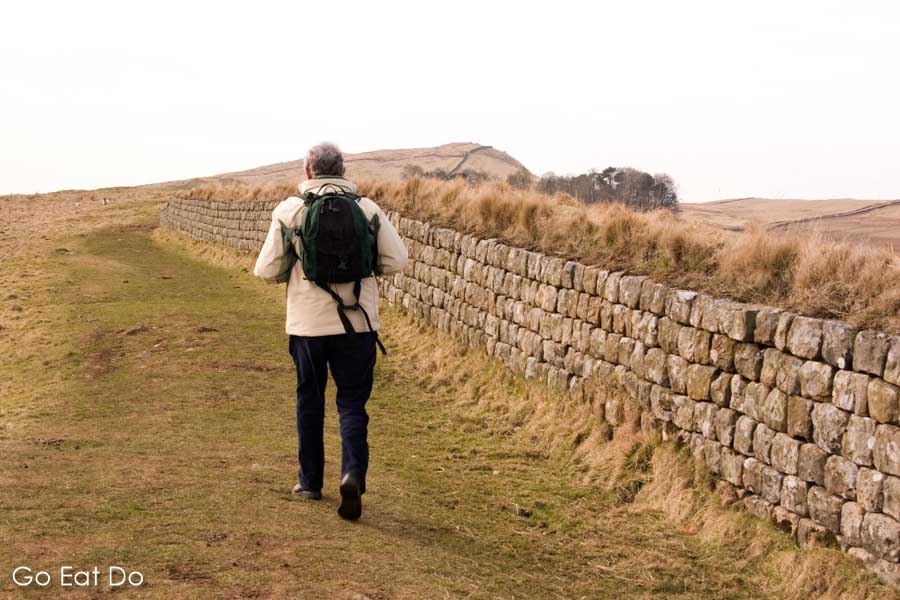
When to visit Hadrian’s Wall
If you’re able to visit Hadrian’s Wall during the week, and outside of school holidays, then you’ll have far fewer people around you. Weekends can prove busy along the wall, especially when the weather is fine.

Hotels near Hadrian’s Wall
Search and book Hadrian’s Wall hotels via HRS:
Books about Hadrian’s Wall
Planning a trip to Hadrian’s Wall? You can buy the following books from Amazon by clicking on the links or cover photos:
Hadrian’s Wall Path: Planning, Places to Stay, Places to Eat by Henry Stedman:




Further information
For information about the countryside around the UNESCO World Heritage Site, see the Hadrian’s Wall Country website. The Visit Northumberland and Visit Cumbria websites also have information about the wall and nearby attractions.
The National Trust also suggests an 8-mile (13-kilometre) circular walk, starting from Housesteads Roman Fort, to Steel Rigg. Sycamore Gap is slightly under a mile from the car park at Steel Rigg.
If you enjoy history why not plan a visit to Vindolanda Roman Fort? In Newcastle, you can discover aspects of life on Hadrian’s Wall in the Great North Museum: Hancock.
Thank you for visiting Go Eat Do and reading this post about this Hadrian’s Wall hike in Northumberland, England. Looking for a place to stay in northeast England? Why not try a night at Langley Castle in Northumberland?
Stuart Forster, the author of this post, is an award-winning travel writer from northeast England.
Photos illustrating this post are by Why Eye Photography.
If you enjoyed this post why not sign up for the free Go Eat Do newsletter? It’s a hassle-free way of getting links to posts on a monthly basis.
‘Like’ the Go Eat Do Facebook page to see more photos and content.
A version of this post was first published on Go Eat Do on 2 April 2017.
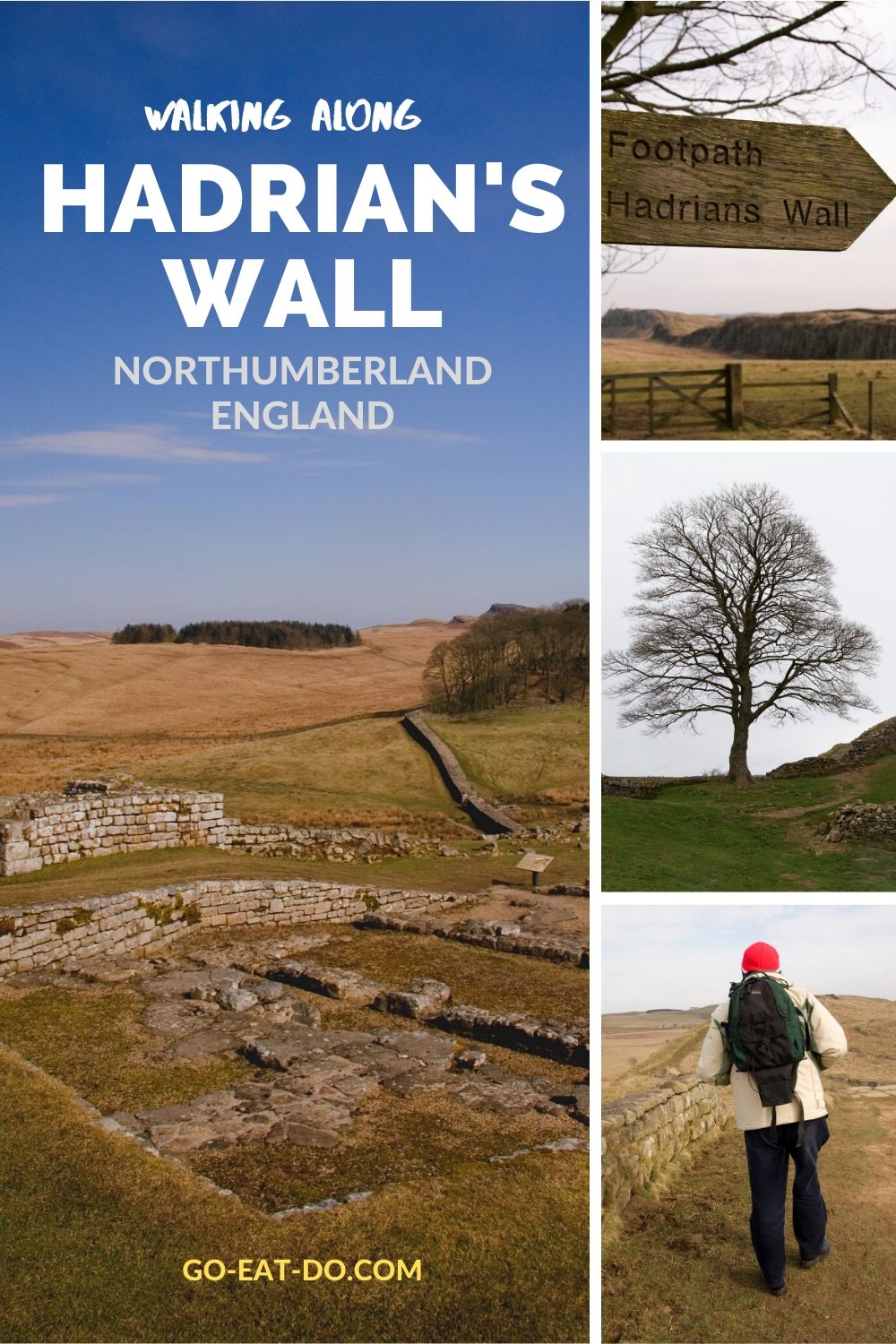



Cindy Tomamichel
April 10, 2017 at 23:47That’s a lovely post, I have shared on facebook and twitter.
Stuart Forster
April 11, 2017 at 15:32Thank you, Cindy, I appreciate you doing that.